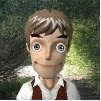


Writing about music is harder than I thought, as I discovered when I started this blog. I want to keep working at it and get better, and some recent books of music writing that have inspired me are pictured here. I enjoyed "The Rest Is Noise" by Alex Ross (and his most recent book, "Listen to This") because of his catholic tastes (no, not the church) -- he can write about Mozart or Bjork or Radiohead or Schubert without being stuffy or condescending (or lost!)
The late Robert Palmer (no, not the "Addicted to Love" guy, the
other late Robert Palmer) was a great champion for the blues as he got older (you MUST see the film "Deep Blues"), and he helped get backwater geniuses like RL Burnside discovered in a big way. There's a piece in his book about Led Zeppelin, and I was curious how he would handle some of the misappropriations that were attributed to some of their early work. He doesn't defend it, but he does point out that in the history of the blues, claiming something 'borrowed' as your own is all too common.
When I want to get the pure, unadulterated stuff, I go back to Lester Bangs (sadly, even later that the 2 Robert Palmers). Lester was played as the gruff mentor in "Almost Famous", Cameron Crowe's love letter to the rock music he grew up with, and when I read him now, I still picture him the way Philip Seymour Hoffman played him (sorry, Lester, I can hear you spinning right now.) Lester brought so much passion to his writing, and he gave critical nods early on to performers like Iggy Pop that less visionary critics dismissed as dumb. There's a Chuck Klosterman book where he mentions the rock musician who derided the Village Voice reviewer for "just writing about his mail" -- meaning the promotional CDs music critics are deluged with. Even if Lester was sometimes guilty of writing about his mail, he always brought a fierce intelligence to his work that I've always admired.














